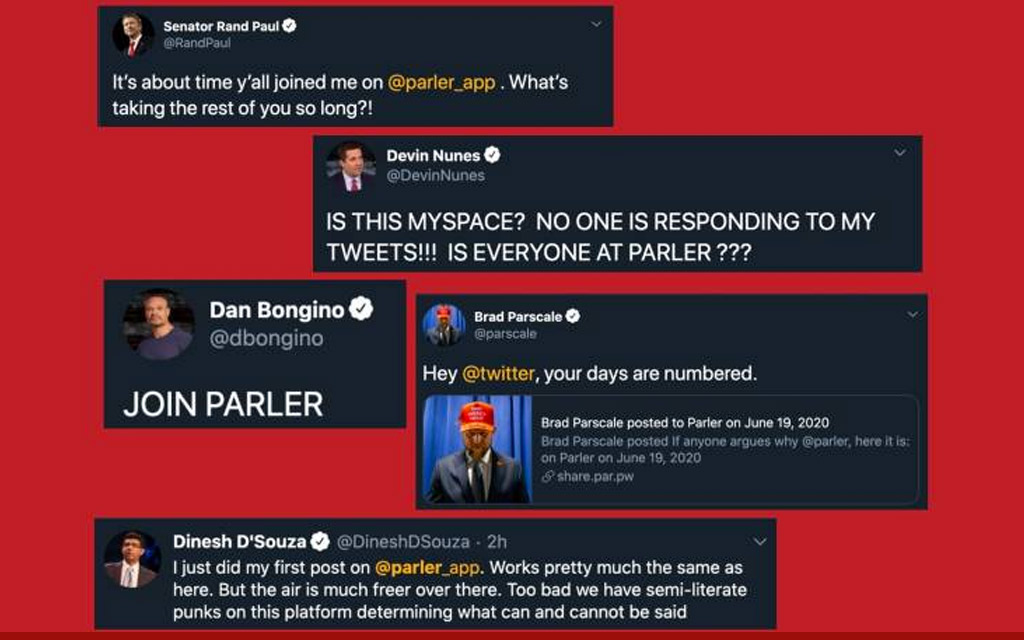As Facebook and Twitter begin to flag more hate speech and misinformation, new social media hangouts step up to fill the void, for those who don’t like such censorship. They create dangerous social media silos.
In 2018, Walt Mossberg, a veteran and highly regarded technology journalist, very publicly announced he was leaving Facebook. His objections were to Facebook’s lackadaisical (I’m being kind) attitudes surrounding data privacy and misinformation. At the time, I wrote Mossberg a personal note asking him “why not fight the enemy you know from the inside, rather than cut a reasoned voice out of the discussion? “ He wrote back that he’d already been that route and it wasn’t working. Zuckerberg wasn’t educable. (Since the pandemic Mossberg has rejoined the Facebook ranks, saying “With this pandemic, I need to keep in touch with friends & family who simply aren’t on Twitter. So I’m reactivating those accounts (including Whatsapp and Instagram ) for the duration. Then I’ll quit again.”
I just spent a long weekend in the bowels of Parler, a social media site that’s been attracting a lot of far right users who claim that they’re tired of Facebook’s and Twitter’s left-leaning bias and quashing of free speech. It reaffirmed my conviction about staying at Facebook to fight misinformation. Facebook’s dialog might often be hateful, disingenuous, and fear-mongering, but we’ve got to keep the pressure on it to find the right solution in an open, not a closed, conversation.
The Facebook/Twitter alternative, a website like Parler, is not only homogeneous in its opinions, it’s an echo chamber for those who basically believe that America will die if Trump is not re-elected. The site is not even particularly engaging. There is nothing more mind-numbing than scrolling through page after page of #MAGA #BLMisajoke #flagburners #vermin #scum hashtags. One recent day’s big trend was a crusade to impeach Nancy Pelosi, and a list indicating that the most tumultuous cities were all led by Democrats.
Parler is not new. It’s name is a play on the French “parlais”, to speak. It looks and acts a lot like Twitter, except here a tweet is called a “parlay” and retweets are “echoes”. Its CEO and co-founder John Matze is a free speech advocate. The service is headquartered in Henderson, Nevada. It was founded in 2018 and claims over 3.6 million users (though most must be lurkers, because after a weekend I felt quite familiar with most of the names and commenters I viewed). According to Parler’s terms and conditions, the platform is committed to free speech, does not mine or sell user data, and does not moderate content based on politics or ideology. It also claims it uses no algorithms to determine what’s presented to you. Matze’s been outspoken with his talking point that “if you can say it on the NYC streets you can say it on Parler.”
But even Parler has its boundaries. According to the Washington Times, “poop, porn and murder” are no-nos. A more extensive list of prohibited behaviors including terrorism are listed on the site’s guidelines. There are actually more prohibited behaviors than I’d expected.
The who’s who list on Parler is mixed, but not that mixed. The targeted group is considerably right of center. The star-power contingent includes Nikki Haley, Devon Nunes, Sean Hannity and Fox News. There’s Eric and Donald Trump, Mike Huckabee, Ted Cruz, Elise Stefanik, Jim Jordan and others, quite recognizable.
Less recognizable but equally potent are those who’ve been banished from their Twitter and Facebook kingdoms. Laura Loomer for one, who despite winning the Republican primary in her bid to represent Florida’s 21st Congressional District has been banned from Twitter for making incendiary remarks about Minnesota Rep. Ilhan Omar and her Muslim faith. She now claims to have a larger following on Parler than what she had on Twitter. Members of the defense team for alleged Kenosha, Wisconsin shooter Kyle Rittenhouse, also emigrated to Parler when their tweets asking for donations for the Rittenhouse Defense were banned. The lawyers will use Parler exclusively.
Parler’s latest salvo against what it calls “technoauthoritarianism” is called Erasebook.info. Ostensibly this new website will educate users about Facebook’s abuse of free speech and sound the call for Facebook members to flee to Parler. In a counterpunch this week, Facebook blocked Erasebook.info from its pages. In a press release issued on Sept. 8, Matze calls out the blocked link, saying, “Apparently, the fact-checker does not want to be fact checked. It’s not the first time that Facebook has resorted to content curation to push its agenda-driven narrative.” He goes on to “encourage critical thinkers everywhere to visit Erasebook.info, to get the facts and join the movement at Parler.”
As any student of human behavior will tell you, a flame sputters out if it’s not fanned. One of the missing ingredients on Parler is the fan. Without the back and forth and seeing the other side of the mirror, the site seems less exciting, totally uniform, and dare I say, boring. It’s almost palpable that Parler users would love to pick a fight rather than agree to agree. In late June, Matze put out a call (a dare?) for high ranking liberals to join in the fun.
Parler is having its moment. And there have been other radicalized social media sites before it like Gab, still quite active with trending swastikas, proud boys, Breitbart stories and more.
When I look at these splinter groups spewing into their echo chambers, it’s truly easy to see that there are no plain truths. Many of the posts spoke passionately of loving freedom, honoring the flag and about the out-of-control spin on large social media sites like Twitter and Facebook.
Parler’s argument is that it is cleaning up Facebook/Twitter’s heavy hand in biased curation. But the more siloed splinter groups like Parler that we create, the more likelihood we’ll see the emergence of alternative realities, with no ground for common discourse.
I thought more than twice about writing this column, shining a spotlight on a group that is so wildly biased. I would also have thought twice about covering the same story had it been a left wing social media site (which I fully expect as the left, too, becomes more unhinged from reality).
But after my weekend field trip I’m going to stick it out in the sometimes less than pleasant worlds of Twitter and Facebook, pressuring them (since the government seems incapable) to enforce their own rules of discourse and flagging or alerting users to suspicious posts.
————-
Jeffrey Wernick, the Chief Operating Officer, of Parler is a libertarian’s libertarian. After I wrote about my experiences on Parler, I spoke with him about Parler’s mission.
Wernick is not a social media maven. An investor by trade, you won’t find his profile in many web searches or on any social media platforms. During our phone call, his NY-tinged accent and colorful speech immediately conjured the image of the car salesman you don’t want to wrangle with (you’ll lose) mixed with a guy who knows his own mind.
We focused our conversation on Parler’s business model. Unlike Facebook, where Wernick says, “your data is the product,” and you have a CEO who “repeatedly is caught telling lies about how data is treated” (at one point he called Zuckerberg a data rapist), he says Parler wants to create a social media platform of influencers. And according to Wernick, Parler would be just as happy to have an AOC, Kamala Harris and leading progressives on its platform as it is to have its current crop of right-wing members.
The company will monetize the platform by letting influencers seek and set their own ad rates, never selling or sharing that data with anyone. Now in beta testing, its influencer program will ultimately charge a flat ad rate, but influencers can mark up ad prices based on their personal influence. He cites influencers like Dan Bongino as the type of person who’s likely to help make the platform a monetary success. He was a little vague on whether ads would be traditional ones labeled as such or more organic, in-place ads that could become part of an influencer’s messaging.
Wernick says, “We’re not making the influencers the product, but we’re allowing them to make money on the platform.” He said he’d love to see young progressive liberals join the site and have more real conversations with differing opinions. When asked if he had objections to my story, Wernick asked me to tell you that the headline should have read, “I Went on Parler and You Should To” rather than the existing “I Went on Parler so You Don’t Have To”. I’m not settling in quite yet.
READ MORE: https://techonomy.com/2020/09/i-joined-parler-so-you-didnt-have-to/




